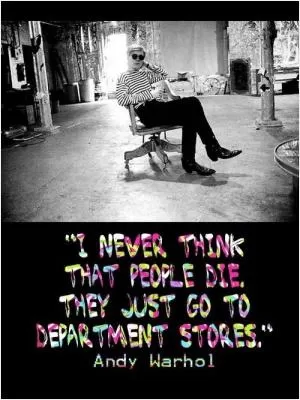I'm afraid that if you look at a thing long enough, it loses all of its meaning

I'm afraid that if you look at a thing long enough, it loses all of its meaning
Andy Warhol, the iconic pop artist known for his vibrant and repetitive images of everyday objects, certainly understood the concept of looking at something until it loses its meaning. Warhol's work often featured mass-produced items such as Campbell's soup cans, Coca-Cola bottles, and celebrities like Marilyn Monroe, all rendered in a bold and graphic style. Through his art, Warhol explored the idea of consumer culture and the ways in which images and objects can become commodified and stripped of their original significance.In Warhol's world, the act of repetition was key to his artistic process. By creating multiple versions of the same image, he forced viewers to confront the idea of saturation and oversaturation. The more we see something, the less impact it has on us. This idea is perhaps best exemplified in Warhol's famous quote, "I'm afraid that if you look at a thing long enough, it loses all of its meaning." For Warhol, the act of repetition was a way to challenge our perceptions and force us to question the value and meaning of the images that surround us.
One of Warhol's most famous works, his series of Campbell's soup can paintings, perfectly encapsulates this idea. By painting multiple versions of the same soup can, Warhol transformed a mundane object into a work of art. However, by repeating the image over and over again, he also stripped it of its original context and meaning. The soup can became a symbol of consumerism and mass production, rather than a simple food item.
Warhol's fascination with repetition and the loss of meaning through overexposure can also be seen in his celebrity portraits. By creating countless images of famous faces like Marilyn Monroe and Elvis Presley, Warhol highlighted the ways in which these figures had been commodified and turned into products for mass consumption. The more we see these images, the less impact they have on us, until they become little more than empty symbols of fame and celebrity.












 Friendship Quotes
Friendship Quotes Love Quotes
Love Quotes Life Quotes
Life Quotes Funny Quotes
Funny Quotes Motivational Quotes
Motivational Quotes Inspirational Quotes
Inspirational Quotes